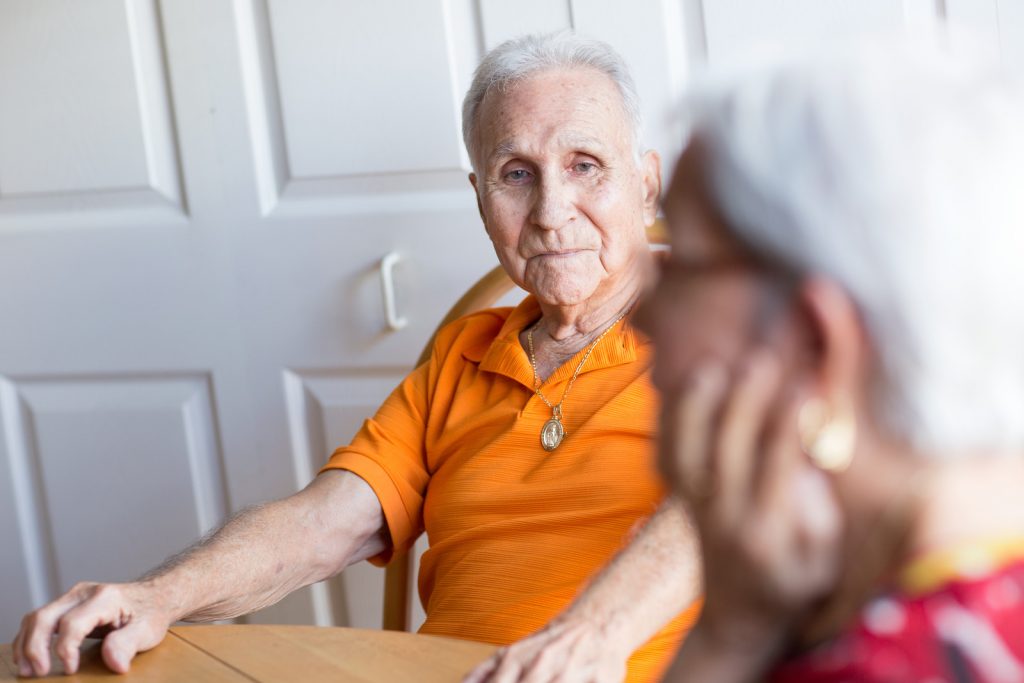When an older adult can no longer take care of everything for themselves, they are often surrounded by individuals who provide the care that they need. This could mean assistance with personal care and routine housekeeping, running errands, managing money, and other activities that the senior might need help with.
If an elderly individual is aging in place at home, their network could consist of family members, nurses, home health aides. If a senior lives in a nursing home, they might be surrounded by nurses, doctors, and employees. With so many people around, it’s important to be able to identify elder abuse and know what to do if you suspect it.
What is elder abuse?
Elder abuse can be presented in several different forms. Abuse is the infliction upon an adult of injury, unreasonable confinement, intimidation or cruel punishment that results in physical or mental harm.
A senior can also experience neglect, or the failure of a caregiver to provide the goods and services necessary to avoid physical harm or mental health issues. And exploitation can occur when someone unlawfully or improperly uses a senior’s resources for their personal benefit or financial gain.
Noticing the signs of elder abuse is important because many elderly individuals do not report it. The National Center on Elder Abuse says that a senior might be reluctant to report abuse because of fear of retaliation, lack of cognitive or physical ability, or they don’t want the abuser to get into trouble.
Nurses and other mandated professionals are required by law to report signs of elder abuse. Caregivers or individuals that have some responsibility of an elderly person should make a report if they suspect an issue.
What to do if you suspect elder abuse
Elderly individuals are often our most vulnerable community members. The following points can help you speak up for seniors who are being abused.
1. Know the signs of elder abuse
Understanding common signs of elder abuse can help you determine if a senior is experiencing elder abuse and report the issue.
Depending on the person and the type of abuse being inflicted, there are a variety of signs to look out for. Signs of elder abuse could include:
- Injuries such as bruises, cuts, burns, or broken bones
- Loud fights between the caregiver and senior
- The senior seems timid around a caregiver
- Poor hygiene, rapid weight loss, and other unattended medical issues
- Changes in behavior such as withdrawal, a change in cognitive abilities or alertness, or depression
When you notice signs of elder abuse, document them. Doing so will help you report elder abuse to the authorities. You can document signs by writing them down, photographing injuries and other health issues, and getting written statements from the senior and witnesses.
2. Talk to the senior
Have a conversation with the senior whom you expect is experiencing abuse. It is possible that the elderly individual might feel embarrassed or afraid, but it’s important to give them support. The senior might be looking for someone to talk to about what is happening to them.
An elderly individual might deny abuse is occurring even when it is obvious. This is common when the abuser is a family member.
Even if the senior denies abuse, you should report it if you suspect it is happening. Authorities can investigate the issue to confirm whether or not the senior has experienced abuse and handle the situation professionally.

3. Talk to the senior’s support system
Sometimes, a senior’s family is not aware of elder abuse issues. They might live in a different location than the elderly person or be out of town when the abuse happens. Family members and other individuals in the senior’s network will usually want to help.
Talking to family members could help resolve the issue faster. Families often have the ability to intervene. For example, if the abuser is a hired caregiver, the senior’s family has the ability to quickly fire them and remove them from the environment. They can also report the incident to the police.
4. Call for help
If you suspect elder abuse, you should report it to the appropriate authorities. Depending on the circumstances, there are a number of different agencies you can call for help with elder abuse.
The following are numbers you can use to make a report:
- If you think that the senior is in immediate and potentially life-threatening danger, call the police at 9-1-1.
- If you suspect elder abuse that is not life-threatening, you can call the Eldercare Locator at 1-800-677-1116. Operators are trained to provide you with information on local resources. You can reach them Monday through Friday, 9 a.m. to 8 p.m. Eastern Time.
- If you live in Summit County, call the Summit County Adult Protective Services at 330-643-7217 for reports and referrals.
5. Make a report
When you suspect elder abuse, it is NOT your job to prove elder abuse is occurring. You simply need to provide the authorities with a detailed report that shows why you believe elder abuse is happening.
Consider the following when making a report:
- Include the contact information of the senior such as their name, address, and phone number.
- Provide information about the senior’s family and caregiver supports.
- Identify the person you suspect is the abuser.
- List any known medical conditions of the senior.
- Specify details about the abuse.
- Note your contact information.
- Report additional instances of abuse as they occur after the initial report.
6. Wait for Adult Protective Services to provide the next steps
Once you make a report, Adult Protective Services will investigate the situation and provide the appropriate level of assistance. Adult Protective Services might assign a caseworker to look further into the elder abuse report.
Do you have an elderly family member who wants to age in place at home? VANTAGE Aging provides wraparound services to help older adults stay in their own homes and active in their communities in Summit, Stark, and surrounding counties. Call us today to see how we can help at 330-253-4597.
*The information in this article is intended solely to provide general information on matters of interest for the personal use of the reader, who accepts full responsibility for its use. This article should not be used as a substitute for consultation with professional legal, medical, or other competent advisors.

